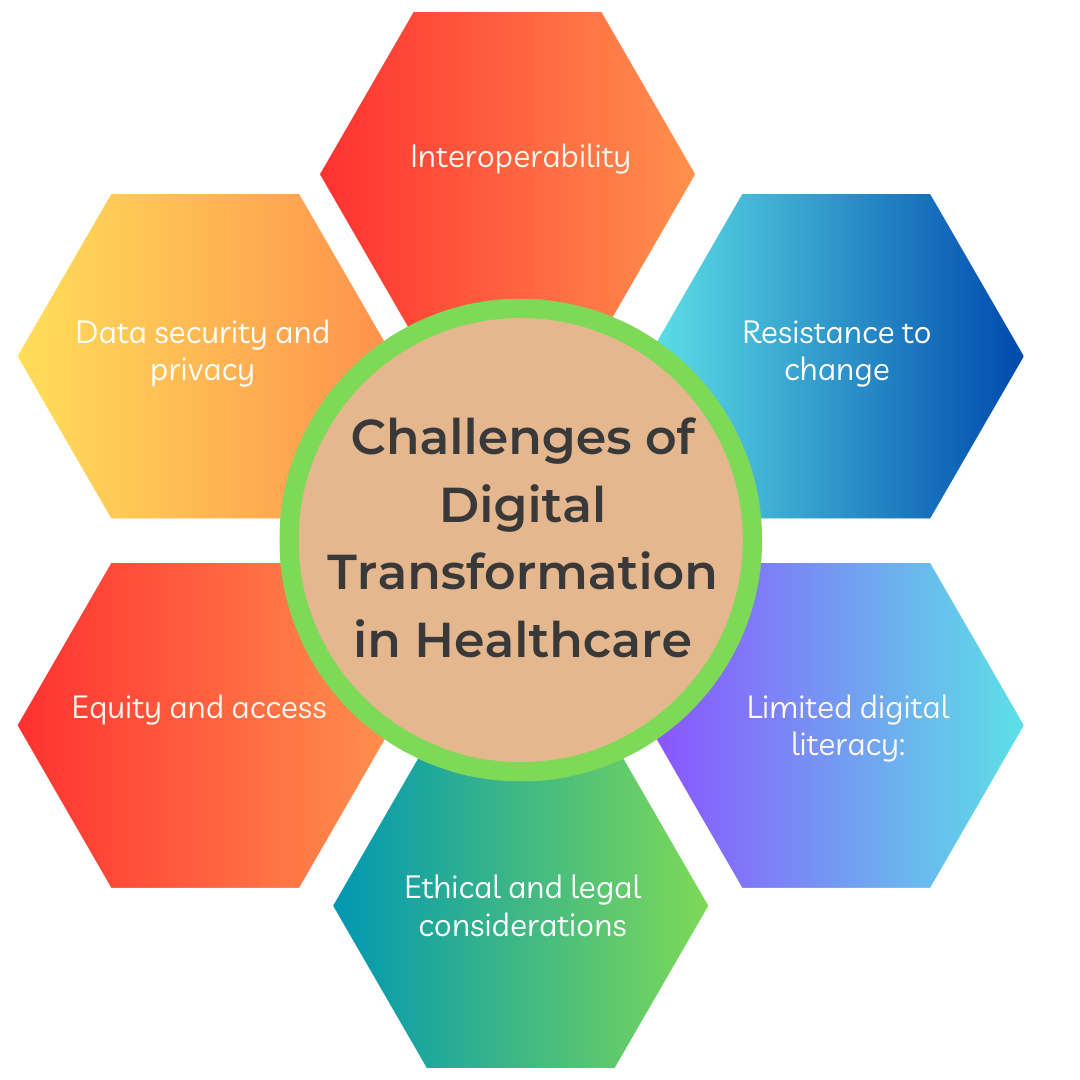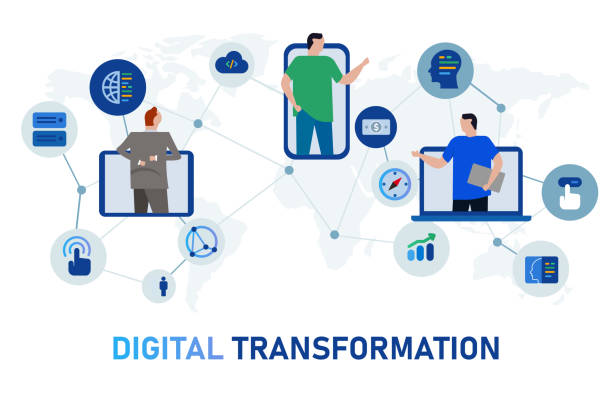Contents
What is Digital Transformation
Digital Transformation is the process of integrating digital technology into all areas of a business or organization, resulting in fundamental changes to how they operate and deliver value to customers.
It involves the adoption of digital technologies such as cloud computing, artificial intelligence, the Internet of Things (IoT), and data analytics to improve business processes, enhance customer experience, and create new revenue streams.
Digital transformation has revolutionized the healthcare industry by transforming the way medical professionals deliver patient care, improving efficiency, and providing better patient outcomes.
Before we dive into the key areas of how digital transformation may impact healthcare, it’s critical to understand its role and challenges.
Also Read – How Digital Adoption has Transformed the Healthcare Sector
Characteristics of Healthcare Digital Transformation
Healthcare digital transformation is the process of leveraging digital technologies to improve healthcare services, processes, and outcomes. Some of the key characteristics of healthcare digital transformation include:
- Patient-centric approach: Digital transformation in healthcare places patients at the center of care delivery. This means that patients can access their health records, communicate with healthcare providers, and receive personalized care.
- Data-driven decision-making: Digital technologies generate vast amounts of data that can be analyzed to improve healthcare outcomes. Digital transformation in healthcare enables healthcare providers to make informed decisions based on data analysis.
- Integration of technology: Healthcare digital transformation involves the integration of technology across different healthcare systems and processes. This includes electronic health records (EHRs), telemedicine, remote monitoring devices, and other digital tools.
- Improved efficiency: Digital transformation in healthcare can improve efficiency by reducing administrative tasks, automating processes, and streamlining workflows. This can free up time for healthcare providers to focus on patient care.
- Increased collaboration: Digital transformation in healthcare enables healthcare providers to collaborate more effectively across different teams and disciplines. This can lead to better care coordination and improved patient outcomes.
- Enhanced patient experience: Healthcare digital transformation can improve the patient experience by providing more convenient access to healthcare services and enabling patients to manage their health more effectively.
Overall, healthcare digital transformation has the potential to improve healthcare outcomes, increase efficiency, and enhance the patient experience.
Challenges of Digital Transformation in Healthcare
Digital transformation is becoming increasingly important in the healthcare industry, with many organizations striving to keep up with the latest technology and advancements in medicine. However, there are some significant challenges associated with digital transformation in healthcare that must be addressed. These include issues such as:
[media-credit id=”1″ align=”none” width=”500″] [/media-credit]
[/media-credit]
- Data security and privacy: With the digitization of healthcare data, the risk of data breaches and cyber attacks increases. It is essential to ensure the confidentiality, integrity, and availability of patient information while providing access to authorized users.
- Interoperability: Healthcare organizations use various digital systems that may not communicate with each other, leading to data silos. It is essential to ensure that these systems can exchange data seamlessly, which requires standardization of data formats and protocols.
- Resistance to change: Healthcare is a complex and highly regulated industry, and some healthcare providers may resist digital transformation due to concerns about changing established practices and workflows.
- Limited digital literacy: Many healthcare providers may not have sufficient digital literacy to effectively use digital tools and technologies, leading to low adoption rates and limited benefits.
- Cost: Digital transformation requires significant investments in technology, infrastructure, and training, which can be a significant financial burden for healthcare organizations.
- Ethical and legal considerations: Digital transformation raises ethical and legal considerations, such as data ownership, informed consent, and liability, which require careful consideration and management.
- Equity and access: Digital transformation may exacerbate existing health disparities if not implemented equitably, and may also limit access to care for patients who lack digital literacy or access to technology.
Benefits of digital transformation in healthcare
Digital transformation in healthcare has brought numerous benefits, some of which include:
- Improved efficiency: Digital technologies have enabled healthcare providers to streamline their processes and automate many tasks, which has resulted in improved efficiency and reduced costs.
- Enhanced patient care: Digital transformation has also led to improved patient care, with technologies such as electronic health records (EHRs) allowing healthcare providers to access and share patient information easily and securely.
- Better outcomes: With the use of advanced analytics and artificial intelligence, healthcare providers can analyze vast amounts of data to identify patterns and insights that can lead to better outcomes for patients.
[media-credit id=”1″ align=”none” width=”612″]

- Telemedicine: With the help of digital healthcare solutions, patients can consult with doctors and specialists remotely via video conferencing, audio calls, or text messaging. This is especially helpful for patients who live in remote or rural areas, or who have mobility issues.
- Electronic Health Records (EHRs): EHRs are digital versions of patients’ medical records that can be accessed by healthcare providers from any location. This reduces the risk of medical errors, improves patient safety, and facilitates better coordination between healthcare providers.
- Health and Wellness Apps: Health and wellness apps help patients to track their physical activity, monitor their diet, and manage chronic conditions. These apps can also provide personalized health recommendations based on the patient’s medical history.
- Remote Patient Monitoring: Digital healthcare solutions can enable healthcare providers to remotely monitor patients’ vital signs, such as blood pressure, heart rate, and glucose levels, and intervene if necessary.
- Personalized Medicine: Digital healthcare solutions can help healthcare providers to personalize treatments and medications based on a patient’s genetic makeup, medical history, and lifestyle factors.
- Health Information Exchange (HIE): HIE allows healthcare providers to securely share patient information with each other, which can lead to better coordination of care and improved patient outcomes.
Conclusion
Digital transformation has become an integral part of the healthcare industry, bringing significant benefits to both healthcare providers and patients. It has revolutionized the way healthcare services are delivered, making them more efficient, effective, and accessible.
Digital technologies such as telemedicine, electronic health records, health apps, wearable devices, and artificial intelligence have transformed healthcare delivery by providing real-time data, improving diagnosis and treatment, reducing medical errors, and enhancing patient engagement.
Moreover, digital transformation has enabled healthcare providers to improve operational efficiency, reduce costs, and enhance the overall quality of care. It has also opened up new avenues for research and development in the healthcare industry.
However, there are also challenges associated with digital transformation, including issues related to data privacy and security, the digital divide, and regulatory compliance.
How Indepth Research Institute (IRES) Can Help?
Indepth Research Institute (IRES) can help in digital transformation in the healthcare sector by providing training, consulting, and research services to healthcare organizations.
- Training: IRES can provide training to healthcare professionals on the use of digital technologies to improve patient care and optimize healthcare operations. This could include training on electronic health records (EHRs), telemedicine, mobile health (Health), and other digital tools that can improve healthcare delivery.
- Consulting: IRES can also provide consulting services to healthcare organizations to help them develop and implement digital transformation strategies. This could include assessing their current IT infrastructure, identifying areas for improvement, and recommending solutions that align with their goals and budget.
- Research: IRES can conduct research on the impact of digital technologies on healthcare outcomes and provide insights that can inform policy decisions and best practices. This could include research on the effectiveness of telemedicine for chronic disease management or the impact of patient portals on patient engagement and satisfaction.
Overall, IRES can play a critical role in helping healthGetty Images/iStockphotocare organizations leverage digital technologies to improve patient care, increase efficiency, and reduce costs.
We have a firm belief that every organization has a unique purpose only they can fulfil in this world. We work with you in organizing your resources to exploit opportunities so that you can fulfil your purpose and realize full potential. We build the capacity of people, processes and systems for organizational success and growth as well as nurturing a thriving ecosystem.
Ready to enhance your skills and boost your career? Explore our corporate training programs now and start your journey to success.








Comment here